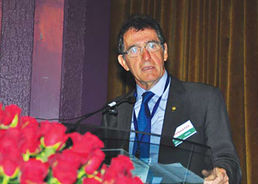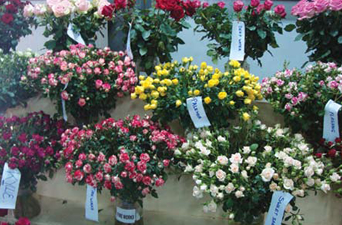 Flower prices over the last six years have grown at only 7 percent whereas costs of production in Kenya have risen by more than 50 percent. This has impacted on the profits and ability to reinvest and expand. Principal amongst these cost increases are power and labour. In addition, the industry has also sought to absorb cost increases through improved efficiencies. This was said by Mr. Richard Fox, Kenya Flower Council Chairman.
Flower prices over the last six years have grown at only 7 percent whereas costs of production in Kenya have risen by more than 50 percent. This has impacted on the profits and ability to reinvest and expand. Principal amongst these cost increases are power and labour. In addition, the industry has also sought to absorb cost increases through improved efficiencies. This was said by Mr. Richard Fox, Kenya Flower Council Chairman.
Growth
Admireably, the industry has been growing from 1995 when flower exports amounted to 25,000 tonnes. Mr. Fox added that the industry grew annually at a remarkable 10 percent up to 2008 when it reached 120,000 tonnes and became one of the top forex earners for the economy, contributing 3 percent to GDP and 9 percent of Kenya’s exports. Equally importantly the industry has created more than 50,000 jobs in direct employment and many more in support industries and services.
This remarkable achievement has been achieved through the benefits of our all round climate, the hard work and skill of our employees, and an enabling and favourable business environment pursued by Government that allowed the private sector to do what it does best.
From 2008 to date, growth has continued but at a more modest 2 percent and for 2015.
Why has this occurred?
There are a number of key reasons. 2008 coincided with the beginning of the downturn in the European economies, the main market, and it is only now that there is optimism that this market is emerging from recession. Despite this, the demand for flowers has not reduced and there has been some growth.
However, growers have been active in looking to sell in other markets. Russia and the US are increasingly important markets and the Far East and most recently China and Australia are opportunities for Kenya’s flower industry to contribute to trade imbalances with these regions. With these initiatives growers have been able to grow their markets in difficult economic circumstances and retain Kenya’s reputation as the leading supplier of quality cut flowers to worldwide markets.
Our main market is the EU where 35 percent of cut flower sales are exported from Kenya. The trade with the EU has been quota and duty free under a temporary agreement but now subject to a deadline to enter a EPA between EAC and EU. It is still a subject to much discussion and the Government is working hard to conclude the negotiations expeditiously. Nonetheless it is crucial to have the EPA for

the industry to remain competitive with other producing countries, not least Ethiopia and Columbia who already have assured duty and quota free access. Whilst the deadline imposed is near, it is imperative that the agreement is signed well before then so that some form of interim ratification can be in place to avoid the imposition of duties albeit as a temporary measure.
Industry Regulations
In the last five years, as the industry has sought to absorb cost increases through improved efficiencies and seeking of more lucrative markets for its products. This has witnessed a growing concern from customers relating to the social and environmental sustainability of flowers they buy. The Kenya Flower Council has promoted a high degree of compliance in meeting these concerns through its Silver Standard. It is currently leading a national initiative to introduce a mechanism to ensure compliance to a level that will satisfy these concerns. “We request the government to fully support this initiative to make compliance mandatory and thereby protect our industry from a small percentage of growers who tarnish the enviable reputation of Kenya’s flower industry” said Mr. Fox.
KFC is playing a leading role in an international programme, called the Floricultural Sustainability Initiative aimed at benchmarking the plethora of standards worldwide that regulate the industry against a level that reflects good sustainable practice. The early signs are that the KFC standard measures up to and will exceed the FSI benchmark. This will place the KFC Silver standard shoulder to shoulder with other international standards.
Public sector- private sector participation
Equally, KFC growers in Naivasha have embraced the Government’s policy to encourage public sector- private sector participation in the development agenda by supporting the Imarisha project started in 2011 and already seeing a coordinated approach to the development and management of natural resources for the benefit of all stakeholders in the Naivasha basin. So whilst customers want to see their products sustainably, we in Kenya must also plan and invest in the long term sustainable use of our resources for the benefit of future generations.
In 2013 his Excellency the President presided over a major change in how the Country is governed. KFC members have embraced the transition to the County structure and have already engaged with the Counties where they are active and have had very fruitful discussions. There are challenges but hope to be able to jointly dismantle the numerous taxes and levies to which they are subjected, 47 at the last count, to make business simpler and more efficient.
Equally in the spirit of a public sector private sector relationship growers are confident that their respective goals will result in mutually agreeable arrangements. His Excellency the President has made it clear from the start that the Government wants to do all it can to encourage industry and create employment. Kenya is open for business. Some remarkable improvements in the development of infrastructure particularly power, road and soon to be rail links have been seen. The expansion of JKI Airport is crucially important to the industry.
